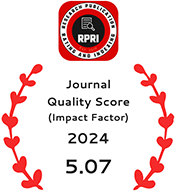Measurement of Central Tendencies
DOI:
https://doi.org/10.55544/jrasb.2.3.29Keywords:
Mean, median, mode, difference between mean and medianAbstract
The main purpose of this article is to understand central tendencies, its application, its types, as well as to learn how to achieve arithmetic mean from grouped and ungrouped data. We will be able to understand geometric and harmonic means and way to calculate them from grouped and ungrouped data. In addition, we will learn which types of mean tends to have more errors and which one to use in which circumstances. We will also be able to know median and mode that are located at the center of data. This article will elucidate the differences between arithmetic mean, median and mode as well as explain ways to calculate mode and median, and pros and cons of median.
Preface: In statistical analysis, we sometimes need to analyze the data with respect to a specific characteristic. This characteristic or number should represent the whole set of data. In statistics, central tendency is a central value for data. Measures of central tendencies are often called averages. The most common measure of central tendency are the arithmetic mean, the median, and the mode. Averages can be divided into two groups. The first type is the average with respect to location and second one is mathematical average. We will explain each one in more detail in this article.
Objectives: The main objective of this article is to understand mean, its types, and usage in daily life.
Methodology: In this article, I have used library research and I have collected data from reliable resources and internet sites.
Downloads
References
Abrahimi, N. and Rafi. A. M. 2013. Statistics and Probability. Afghanistan.
Agha, Z. 2012. Principle of Statistics. Afghanistan.
Asil, M.A. 2014. Basic theories of statistics and their application in economics. Fourth Edition. Afghanistan
Chainy,Dr.G.B.N and.G.Mishra. (2004): Basic Biostatistics: Kalyani publishers. New Delhi India
Dodial, M. A. 2011. Statistics. Afghanistan.
Emal, A. H. 2002. Statistics. Afghanistan.
Hamidi, A. 2014. Statistics. Third edition. Afghanistan.
Mason, Robert D. and Douglas A. Lind (1999): Statistical. Techniques in Business and Economics: 10th ed. lrwin/McGraw-Hill. Printed in U.S
Rawof, A. 1980. Principles Statistics. Afghanistan.
Downloads
Published
How to Cite
Issue
Section
License
Copyright (c) 2023 Muhajir Sial, Abdullah Abid

This work is licensed under a Creative Commons Attribution-NonCommercial-NoDerivatives 4.0 International License.


















